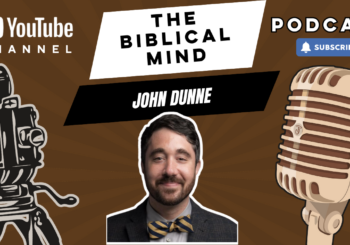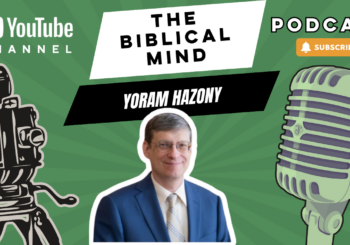Part of the Family Conflicts and the Restoration of the Cosmos series
Family Conflicts and the Restoration of the Cosmos, Part II: Kingship and Servanthood within the Elected Family
Throughout the Hebrew Bible, kingship is an important theme. In the creation narrative of Genesis 1, YHWH bestows humanity’s identity and function in terms associated with royalty.1J. Richard Middleton’s The Liberating Image: The Imago Dei in Genesis 1 offers the most comprehensive and insightful study on the matter in my opinion. An interesting qualification on the royal identity and function of humanity in Genesis 1, as based on a kinship relation between YHWH and human beings, is offered by Catherine McDowell in her article linked here on the CHT. The apex of humanity’s failure to be royal representatives of YHWH’s kingship is the construction of the Tower of Babel under the rulership of Nimrod, a royal figure who gains power on earth as a powerful hunter (Gen 10:8-10). This failure causes YHWH to “reboot” creation to develop a new plan, now with one specific family: Abraham, Sarah, and their descendants. Here, again, the theme of kingship appears. YHWH declares concerning Sarah: “I will bless her, she will become a mother of nations, and kings of peoples will come from her” (Gen 17:16).
Enjoying this article? Read more from The Biblical Mind.
In my first article for the CHT, I showed how the morals of conflict resolution emerge in the narrative of Abraham, Sarah, and Hagar in Genesis 16, as part of YHWH’s way of dealing with cosmic conflicts. The basic point of this biblical narrative is that conflicts, whether particular or cosmic, can only find resolution and give way to divine blessing if all parties involved demonstrate an attitude of humiliation and servanthood, even to the point of risking one’s life. This attitude was modeled by Hagar, and eventually by Abraham and Sarah as well. I also noted how the elected family needed to experience humiliation in Egypt, the land of Hagar, to learn this attitude.
Along the way, we encounter the narrative of Jacob’s sons, Joseph and his brothers, in their struggle for kingship and servanthood. In this second part of my study, I will explore this struggle between Joseph and his brothers to identify the Hebraic morals for kingship. The underlying questions I will try to answer are generated by the divine promise to Sarah in Genesis 17:16. They are the following: Who will be these kings, and what kind of rule will they exercise? These questions are about kingship and servanthood. In the beginning, it seems like kingship implies the servanthood of others. But surprisingly, we instead find a servant kingship.
I Have a Dream . . . To Rule
The conflict between Joseph and his brothers seems to follow a very definite script: Joseph’s two dreams (Gen 37:5–10). They are always lying behind the narrative, even when some of their aspects are frustrated instead of fulfilled. In the first dream, there is the image of “sheaves of grain out in the field” (Gen 37:7). In the second dream we find the image of celestial bodies: “the sun, the moon, and eleven stars” (Gn 37:9). These images carry important cultural meanings and textual relations to other parts of the book of Genesis as a whole.
The image of celestial bodies indicates that the events in the narrative have implications not only for this family, but also for the whole cosmos. Here, we again find a particular family struggle that is cosmically relevant. The celestial bodies are also important political symbols (see Num 24:17; Isa 14:12)2Celestial bodies as political symbols derive from their use to identify deities and then the relation between deities and kings. Mark S. Smith, for example, show how the deities on the second level of the Ugaritic pantheon are identified with celestial bodies, for example, Shapshu (the Sun), Yarih (the Moon) and Athtar (the Morning Star). See Mark S. Smith, The Memoirs of God: History, Memory, and the Experience of the Divine in Ancient Israel (Minneapolis: Fortress, 2004), 102. linking this narrative to the divine promise concerning Sarah. To a certain degree, the cosmic and political aspects are related, so that Joseph’s dreams point to “cosmic mastery,” by political means.3 See Leon R. Kass, The Beginning of Wisdom: Reading Genesis (Chicago: University of Chicago Press, 2006), 518.
The image of “sheaves of grain out in the field” is not what we expect from a nomad and pastoral family. Though it could very well be an image relating Joseph’s dreams to his activity in Egypt, which includes “gathering” (qābaṣ, Gen 41:48), “stocking” (ṣābar, Gen 41:49), “food” (ʾōkel, Gen 41:48) and “grain” (bār, Gen 41:49),4That is how Casey Strine understands the image, because he is mostly concerned with the famine and migration issues of the narrative and not with the family power dynamics. See Casey A. Strine, “The Famine in the Land Was Severe: Environmentally Induced Involuntary Migration and the Joseph Narrative.” Hebrew Studies 60 (2019): 55–69, especially 59. I believe there is more to the image. In another narrative of conflict between brothers, the context of “out in the field” (Gen 4:8, baśādeh)5his word can mean a field out in the wild or can describe a cultivated land. The second meaning is found, for example, in the Holiness Code (see Jeffrey A. Fager, Land Tenure and the Biblical Jubilee: Uncovering Hebrew Ethics through the Sociology of Knowledge [Sheffield: Sheffield Academic Press, 1993], 89). In Genesis 4 it can mean a field out in the wild because of the association between this place and crimes committed out of range of help (see Deut 22:25–27; see Gordon Wenham, Genesis 1–15 [Dallas: Word, Inc., 1987], 106). But because of Cain’s agricultural activities, it is probable that the meaning here is that of cultivated land by “irrigation and human effort” (Wenham, Genesis 1–15, 58). is crucial. In Cain and Abel’s conflict, the tension is between Abel’s pastoral lifestyle, typical of the nomadism of Abraham’s family, and Cain’s agricultural lifestyle, typical of the sedentary urban monarchies.6See Ithamar Gruenwald, Rituals and Ritual Theory in Ancient Israel (Atlanta: Society of Biblical Literature, 2003), 44. For a thorough study of the shepherd culture in contrast to agriculture, see Yoram Hazony, The Philosophy of Hebrew Scripture (Cambridge: Cambridge University Press, 2012), 103–39. This is exactly the relation that the text intends when it depicts Cain as a “city builder” (cf. Gen 4:17), the father of “urban culture” (cf. Gen 4:19–22), and originating a violent posterity (cf. Gen 4:23–24). In this level of meaning, agriculture and urban administration form an economic symbiosis to exploit the agrarian and shepherd population for the benefit of the urban population, exactly like in Egypt.7Gruenwald, Rituals and Ritual Theory in Ancient Israel, 74.
Being used to this kind of kingship rule, and understanding the meaning of Joseph’s dreams, his brothers respond angrily (Gen 37:8). For them, the first dream means that Joseph will “reign” (mālak) over them and “dominate” (māšal) them. These verbs are used in a syntactical construction of emphasis. The verb is duplicated, with the first in the infinitive absolute and then in the imperfect, making them more like rhetorical questions of reprobation (i.e., “you will certainly not dominate over us”) than anything else. Certainly their reprobation is related to their view of monarchic cultures, reflected in the way they describe the “governor of the land” (Gen 42:6) of Egypt, not knowing he is Joseph. According to them (Gen 43:18c), he uses his power to “accuse [us]” (gālal), to “dominate [us]” (nāṭal), to “seize [us]” (lāqaḥ) “as slaves” (laʿăbādîm) and to “seize [our donkeys]” (lāqaḥ).8A literal translation of the Hebrew of Gen 43:18c would be: “He brought us here to role against us and fall upon us, and take us as slaves and our donkeys.”
Both dreams already suggest this kind of royal exercise of power in the action of “bowing down” (shāḥâ, Gen 37:7, 9). The action does not necessarily point to a coercive power that humiliates, but in Jacob’s response to the second dream, he emphasizes the humiliation aspect of the action by adding the qualification “to the ground” (ʾarṣâ, Gen 37:10).9There is some intertextuality here with the previous narrative of Isaac, Esau and Jacob. When Isaac blesses Jacob, thinking he was Esau, he says the following: “May peoples serve you and nations bow down to you. You will be lord over your brothers, and the sons of your mother will bow down to you” (Gen 27:29, NET Bible). In the encounter between Esau and Jacob in Genesis 33, Jacob “bowed down to the ground (wayyištaḥû ʾarṣâ) seven times” (v. 3).
The brothers’ angry response can also be related to Joseph’s attitude and his function within their family. At the beginning of the narrative (Gen 37:2), the narrator tells us that Joseph was seventeen years old and was “the one who shepherds” (hāyâ rōʿeh). The sequence of the sentence is ʾet ʾeḥāyw. With this qualification, the sentence might mean that Joseph was the one who shepherds with his brothers or that he was the one who shepherds his brothers. Because the information we get right after it is that Joseph would bring bad reports about his brothers to his father, and that he was his father’s favorite, then the second option is probable. Therefore, Joseph was a kind of supervisor over his brothers. This makes better sense of the whole narrative. It explains why Joseph would have such pretentious dreams. It also points to the political discussion the narrative will present, given that a shepherd of other people was a common image of kingship in the ancient Near East (some biblical examples appear in 2 Sam 7:7 with its parallel in 1 Chron 17:6).10In 2 Sam 5:2, a text dealing with David’s ascension as the king of Israel, we have the same construction with the verb and the direct object particle: rāʿâ ʾet.
So this is what Joseph’s dreams imply and the whole narrative prompts readers to expect and wonder how they will be fulfilled. Will Joseph be one of the kings who descend from Sarah? If so, is he going to exercise his kingship by means of coercive power that humiliates and even enslaves his family and all the other families of the earth?
A Model of Servant Kingship for the Most Vulnerable
As with other biblical narratives, Joseph’s does not offer a straightforward moral lesson. Things are a bit more complicated and ambiguous. Although Joseph’s dreams are partially fulfilled, his royal intentions and the negative expectations of his brothers are not. Considering how the brothers behave before Joseph in Egypt, it initially seems as if everything went like they expected. Their attitude is one of servitude. There are several occurrences of the Hebrew root ʿbd (“to serve”, “servant”, “slave”, etc.) in the middle of the narrative. In Genesis 42:10, the brothers tell Joseph: “No, my lord . . . your servants (ʿăbādêkā) have come to buy food.” The same meaning will appear in vv. 11 and 13. Then, in Genesis 43:18, the brothers express their fear that the “governor of the land” will punish them by making them his “slaves” (ʿăbadîm). But that is not how the narrative concludes.
Two unexpected things happen by the end of the narrative. First, when Jacob comes down to Egypt and meets Joseph, he does not “bow down,” as we would expect for the fulfilment of the second dream. They first hug and cry together (Gen 46:29), and later it is Joseph who “bows down” before Jacob (Gen 48:12). The text is clear about the inversion of expectations, because while Jacob was the one who questioned Joseph about bowing down “to the ground” in Genesis 37:10, it is Joseph who actually bows down before Jacob “to the ground” (ʾarṣâ). Second, in Genesis 50:18, after Jacob’s death, Joseph does not take revenge on his brothers by enslaving them—contrary to their expectations. The text prepares the reader to finally see the fulfilment of the dreams as initially expected by Joseph and his brothers. It says: “Then his brothers also came and threw themselves (wayyippĕlû) before him; they said ‘Here we are; we are your slaves’ (ʿăbadîm).” But the verb “throw down” used here is different than the “bow down” (shāḥâ), used in Genesis 37:7, 9–10, which is one of the evidences that this scene is a fulfilment of the brother’s interpretation of the dreams. To their surprise and also to the reader’s surprise, Joseph does not take the opportunity to enslave or subjugate his brothers. Rather, he opts for a different relationship with his brother. Instead of a relationship between a king and slaves, in Genesis 50:21 Joseph establishes that he is his brother’s provider.
The significance of this option becomes clearer when we realize that the political dimension of the kingship struggle between the brothers cannot be separated from the issue of food supply. The nomadic critical view of monarchic culture, as we have seen, is related to agriculture, exploitation of land and work, and the unjust distribution of resources. The narrative, however, does not only deal with famine and food supply. It also deals with family survival and a real concern for the youngest children (ṭap, “little ones,” Gen 43:8; 45:19; 46:5; 47:12; 47:24; 50:8, 21). Crucial parts of the narrative relate family survival to children’s survival, as in 43:8: “Then we will live and not die—we and you and our little ones.” That’s how the conclusion of the narrative subverts the kingship struggle between the brothers. What they thought meant the use of power to restrict the people’s food supply and threaten the survival of their little ones, in the end, meant the use of power to provide food so that their little ones could live.
The result of Joseph’s use of power, not as king according to their cultural experience, but as servant and provider for others, especially the most vulnerable, the little ones, is that Israel, i.e., Jacob’s family, “fructified” (wayyiprû) and “multiplied” (wayyirbû) in the land of Goshen (Gen 47:27). Referencing Genesis 1:28, this is a clear expression of divine blessing for all humanity.
Inversions in the Story of Joseph and His Brothers
How did this move from pretentious king over his bothers to provider for his brothers’ little ones happen in Joseph’s life? The answer resembles what happened to Hagar. I demonstrated in my first article for the CHT that Hagar’s pregnancy led her to treat Sarah as inferior, but it was through her humiliation and submission that she entered the family of the covenant to be blessed accordingly. Joseph also starts by regarding his brothers as inferior. In response, they do to Joseph what they feared he would do to them: they enslave (lāqaḥ, Gen 37:24) him. As a result, Joseph is humiliated several times under a monarchic power in Egypt. Instead of using his power to rule and dominate his brothers, he uses it to protect the life of his brothers and their little ones, because he himself had suffered under the rule and domination of his brothers and a monarchic power. The inversion of desired kingship to active servanthood is due to Joseph’s experience of forced humiliation, like Hagar’s.
The identity of Joseph as victim, just like Hagar, is important. It is his experience of slavery, oppression, and even exile, that teaches him how God envisions the right use of power to “preserve the lives of many people” (Gen 50:20; cf. 45:5). Joseph’s decision to serve his brothers and their little ones, despite their wrongs against him, seems to be the path of justice by which Abraham’s family blessing will reach all the families of the earth (Gen 12:1–3) and by which the divine blessing will reach all humanity (Gen 1:28). Therefore, even though Joseph does not humiliate himself like Hagar did, he does use his power and influence for the benefit of those who did actually put his life at risk, which is similar to the context of Hagar’s experience.
Unlike Genesis 16, Joseph’s story has a political context that makes the moral lesson even more ambiguous, but it also makes this family conflict and resolution even more relevant for understanding cosmic conflicts and resolutions. Although Joseph’s role is definitely related to the preservation of his family and posterity (Gen 45:7), his wisdom and service also benefit many other families. The description of the application of Joseph’s policies starts with a universal scope: “And all the earth came to Egypt, to Joseph, to get provisions, for the famine had grown harsh in all the earth (bǝkāl-hāʾāreṣ)” (Gen 41:57). Further, when Jacob’s family is in Egypt “there was no bread in all the earth”11Robert Alter’s translation in his The Hebrew Bible: A Translation with Commentary (New York: W. W. Norton and Company, 2018). All other English translations prefer the term “land” making the scope more localized, as the text will focus on Egypt and Canaan. (wǝleḥem ʾên bǝkāl-hāʾāreṣ, Gen 47:13). Of course, the narrative focuses on Egypt and Canaan, but the intention is to situate Joseph’s action in a global crisis with global effects. That’s why by the end the focus changes from his family and posterity to the lives of “many people” (ʿam-rāb, Gen 50:20).
Though the ambiguous morality of the narrative concerning Hagar, Abraham, and Sarah is very limited to their family dynamics, here the ambiguity becomes more generalized because of its political context. While it is true that Joseph uses his power to serve other people and preserve many people’s lives, without any hint of coercion, his policies are still applied under the logic of political power. The benefits, then, come with many strings attached. The people lose their land to Pharaoh and even sell themselves as his slaves (Gen 47:18–21). Again, there is no use of coercion, the people “gladly” sell their land and their workforce as slaves, because Joseph preserved their lives: “You have kept us alive! May we find favor in the eyes of our lord, in being Pharaoh’s slaves” (Gen 47:25, Robert Alter’s translation). Even in his service for the preservation of many people’s lives, Joseph created the proper context for the abuse of power characteristic of the monarchic culture his family so abhorred. In the end, Joseph’s servanthood that made his family prosper in Egypt during a severe famine, also prepares the land for them to be enslaved and wither.
In the midst of this moral ambiguity, the Joseph narrative can still help answer the two questions I presented in the beginning of the article about the elected family: Who will be these kings who come from Sarah and what kind of rule will they exercise? It is certain that these kings will not exercise a coercive power; rather, they will be servants who use their power for the benefit of their subjects, especially the “little ones,” preserving the lives of many people. This, of course, resonates with YHWH’s purpose for Abraham’s family to bless all the families of the earth. Taking seriously Jacob’s sons struggle with kingship and servanthood, it becomes clear that the kings who will come from Sarah are servants. That’s why the whole narrative can be confusing, just as was the case with Genesis 16. In both narratives, we find negative and positive experiences of servanthood. The positive servanthood, that which leads to resolution of conflicts and gives way to the divine blessing, is learned through the experience of negative servanthood. In Joseph’s narrative, the difference between the two is clear, while for Hagar the difference is more subtle. What is clear here is that the kingship and servanthood dynamic is turned on its head, so that to be a king is to be a servant.
But by the end of Joseph’s narrative, it feels very much like Joseph is not one of those kings who will come from Sarah. Yoram Hazony touches on an important issue concerning Joseph. Although he abandons his pretentious dreams of kingship and becomes a servant for the benefit of others, the means he uses to preserve the lives of his family and many other families is “the apparatus of empire.”12The Philosophy of Hebrew Scripture, 134. It seems, then, that in this political context, the morals of conflict resolution depends on differentiating between the coercive use of power and the beneficial power of service, and it also depends on the choice of the means used to exercise this power. This is not a complete critique of kingship or politics as they are, but of certain forms they might take. The use of the term “empire” by Hazony indicates that it is a matter of concentrated and widespread power which cannot be used to deliver the divine blessing, in this case feeding the hungry and preserving many lives, without getting in return something that compromises the blessing itself.
The kings who come from Sarah, therefore, won’t rule with coercive power, but they also won’t rule with the structures of empire, or the typical ideology and organization of sedentary urban monarchies. Joseph was a great model of the kings who come from Sarah for moving from a vision of kingship by coercive power to a kingship of service. But he still depended on the structure and logic of empire. Interestingly, the greatest of all of the inversions in the Joseph narrative is that his story is not really about him, but about Judah. This will be topic of part III.
Bibliography
Alter, Robert. The Hebrew Bible: A Translation with Commentary (New York: W. W. Norton and Company, 2018).
Fager, Jeffrey A. Land Tenure and the Biblical Jubilee: Uncovering Hebrew Ethics through the Sociology of Knowledge (Sheffield: Sheffield Academic Press, 1993).
Gruenwald, Ithamar. Rituals and Ritual Theory in Ancient Israel (Atlanta: Society of Biblical Literature, 2003).
Hazony, Yoram. The Philosophy of Hebrew Scripture (Cambridge: Cambridge University Press, 2012).
Kass, Leon R. The Beginning of Wisdom: Reading Genesis (Chicago: University of Chicago Press, 2006).
Smith, Mark S. The Memoirs of God: History, Memory, and the Experience of the Divine in Ancient Israel (Minneapolis: Fortress, 2004).
Strine, Casey A. “The Famine in the Land Was Severe: Environmentally Induced Involuntary Migration and the Joseph Narrative.” Hebrew Studies 60 (2019).
Wenham, Gordon. Genesis 1–15 (Dallas: Word, Inc., 1987).
Did you enjoy this article? Check out The Biblical Mind podcast.





